Phosphatidylserine: A Natural Compound for Mental Agility
Introduction
In a world where multitasking, deadlines, and constant notifications dominate daily life, keeping your mind sharp has never been more essential. ✨
Enter Phosphatidylserine (PS) — a naturally occurring phospholipid that helps your brain think faster, remember more clearly, and stay calm under stress.
This powerful compound supports everything from memory formation to stress resilience and focus. Let’s dive deep into how it works, where to get it, and how it pairs beautifully with supplements, breathwork, and therapy to sustain long-term cognitive agility.
Looking for supplements for Brain Fog? Click here.
🧩 What Is Phosphatidylserine?
Phosphatidylserine (pronounced fos-fa-tie-dyl-sir-een) is a phospholipid, a type of fat molecule that forms the outer layer of your brain’s cells. 🧬
It’s found in every cell membrane in your body, but it’s especially concentrated in the neurons — the nerve cells responsible for thought, emotion, and communication.
Think of it like this:
If your brain cells were computers, phosphatidylserine would be the wiring that keeps them connected and efficient. ⚡
In short, PS ensures that your brain’s “hardware” runs smoothly so your “software” — memory, focus, creativity — performs at its best.
🧠 The Science Behind Mental Agility
🔹 The Role of Cell Membranes
Your neurons communicate through electrical impulses and chemical signals. These exchanges depend on the integrity of the neuron’s outer membrane, which acts as a gatekeeper for nutrients, neurotransmitters, and waste products.
Phosphatidylserine keeps these membranes flexible and fluid, enabling neurons to fire rapidly and efficiently.
A healthy membrane means quicker thinking, faster recall, and better focus.
🔹 The Neurotransmitter Connection
PS also supports the production and release of several key neurotransmitters:
Acetylcholine – vital for learning and memory
Dopamine – linked to motivation and focus
Serotonin – stabilizes mood and emotional regulation
This makes PS not just a memory booster — but a whole-brain performance enhancer. 💡
🧬 How Phosphatidylserine Enhances Memory and Focus
Phosphatidylserine has been studied extensively for its role in improving short-term memory, recall speed, and concentration.
In a landmark clinical trial published in Aging, older adults taking 300 mg of PS daily showed significant improvements in verbal recall, learning ability, and mood stability after just 12 weeks.
Mechanisms at Work:
🧩 Neuroplasticity Support – PS promotes the formation of new neural connections, enhancing adaptability.
⚡ Improved Synaptic Function – It maintains communication efficiency between neurons.
🔋 Reduced Cortisol Impact – PS lowers stress hormone levels that interfere with cognitive clarity.
Together, these effects make your brain more responsive, agile, and resistant to fatigue.
🧘 Stress, Cortisol, and Mental Fatigue
We all know the feeling: too many tabs open (in your brain and your browser).
Cortisol — the body’s main stress hormone — spikes during chronic stress, clouding memory and slowing mental performance.
Phosphatidylserine helps by balancing cortisol levels and protecting neurons from stress-induced damage.
A 2004 study in Sports Medicine found that PS supplementation reduced cortisol spikes in athletes during intense training, improving both focus and recovery.
For everyday life, this translates to:
😌 Less burnout
🧘 More mental resilience
💭 Clearer thinking even under pressure
💊 Supplementation: How to Use Phosphatidylserine
Phosphatidylserine is available in both natural and synthetic supplement forms. It’s most effective when used consistently over time — think of it as brain nutrition, not a quick fix.
🧠 Recommended Dosage
Typical range: 100–300 mg daily
For memory and focus: 100 mg three times daily
For stress support: 200 mg before high-stress events or workouts
Studies show optimal results after 4–12 weeks of continuous use.
🌿 Source Forms
Originally, PS was derived from bovine (cow) brain tissue. Today, most supplements are soy-based or sunflower-based, which are safe and non-animal alternatives.
⚡ Bioavailability Boosters
For better absorption, take PS with a meal containing healthy fats — like avocado, olive oil, or salmon. 🥑🐟
Looking for supplements for Brain Fog? Click here.
🧪 Natural Food Sources of Phosphatidylserine

While supplementation ensures consistency, certain foods provide PS naturally:
| Food | Approx. PS (mg per 100g) |
|---|---|
| 🧠 Bovine brain (historically used) | 700 |
| 🐟 Mackerel | 480 |
| 🐟 Tuna | 360 |
| 🍗 Chicken heart | 130 |
| 🍳 Egg yolk | 85 |
| 🌱 Soy lecithin | 100 |
| 🥜 White beans | 100 |
Plant-based eaters can rely on soy lecithin or sunflower lecithin, which not only provide PS but also aid liver and nerve health.
🧬 Brain Cell Regeneration and Anti-Aging
One of PS’s most exciting properties is its potential to slow cognitive aging.
As we age, brain phospholipid levels naturally decline. Supplementing PS restores this balance, improving:
🧠 Reaction time
💭 Working memory
⚙️ Problem-solving ability
In clinical studies, older adults supplementing with PS experienced decades-younger cognitive performance, with improvements in recall and verbal skills.
PS may also enhance mitochondrial function, giving neurons the energy to repair themselves and stay resilient.
🧘 Breathwork: Oxygenating the Brain
Pairing PS supplementation with breathwork multiplies the benefits for mental clarity.
Why?
Your brain consumes about 20% of the body’s oxygen, and deep breathing increases oxygen availability, fueling ATP (energy) production inside neurons.
Phosphatidylserine ensures those neurons are ready to receive and utilize that energy efficiently.
Want to try Breathwork? Click Here.
Try This 5-Minute Breath Routine:
Inhale slowly through your nose for 4 seconds 🫁
Hold for 4 seconds
Exhale for 6 seconds through the mouth
Repeat for 5 minutes
This pattern increases oxygen delivery and stimulates the parasympathetic nervous system, which PS supports by lowering cortisol.
Result: a calm, focused, and energized mind. ⚡
🧘 Therapy and Cognitive Flexibility

Therapy — especially approaches like Cognitive Behavioral Therapy (CBT) and Mindfulness-Based Cognitive Therapy (MBCT) — trains the brain to form new neural connections.
Phosphatidylserine strengthens the biological foundation for this process.
🧩 It enhances synaptic plasticity, allowing faster adaptation to new thought patterns.
💭 It supports emotional regulation, improving self-awareness during therapy.
🔄 It boosts learning efficiency, helping insights “stick.”
When combined, therapy and PS form a synergy: psychology reshapes patterns, PS supports the physical rewiring of the brain.
Looking for online therapy ? Click Here.
🧘 Phosphatidylserine and Sleep
Sleep is when the brain consolidates memories — and phosphatidylserine plays a direct role here, too.
By reducing nighttime cortisol and supporting neurotransmitter balance, PS promotes deeper, more restorative sleep cycles.
Better sleep leads to:
Improved memory retention 💤
Sharper problem-solving skills 💡
Enhanced mood stability 😊
People who take PS before bed often report waking up feeling mentally refreshed — as if their mind got a full “defrag” overnight.
⚖️ Stress Management and Cortisol Balance
Phosphatidylserine’s anti-stress effects are backed by multiple human studies.
In one study published in Nutrition Research, participants who took 400 mg/day of PS showed lower cortisol levels and improved mood under mental stress tests compared to placebo.
PS acts as a natural “cortisol modulator,” ensuring that stress responses don’t spiral into fatigue, irritability, or burnout.
This is why PS is often included in nootropic stacks for entrepreneurs, athletes, and students — anyone performing under pressure. 💼
🧬 The Synergy with Other Nutrients
PS doesn’t act alone — it thrives in synergy with other brain-supporting compounds.
| Nutrient | Synergy Effect |
|---|---|
| Omega-3 (DHA/EPA) 🐟 | Boosts PS integration into neuron membranes |
| Choline 🥚 | Enhances acetylcholine synthesis |
| B Vitamins ⚡ | Support neurotransmitter metabolism |
| Magnesium Glycinate 🧂 | Reduces stress and promotes calm focus |
| CoQ10 🔋 | Improves mitochondrial energy for sustained cognition |
This combination builds a foundational brain health stack — biochemical support from every angle.
🧩 PS and Exercise Performance
PS isn’t only for the mind — it enhances physical performance too.
It optimizes cortisol response, improves endurance, and reduces muscle soreness. Studies in athletes show PS supplementation leads to:
Lower perceived exertion during training 💪
Faster post-workout recovery 🏃
Improved reaction time and coordination ⚡
That’s because mental fatigue often precedes physical fatigue. When your brain stays sharp, your body follows.
🧠 Mood and Emotional Regulation
Phosphatidylserine also supports emotional balance by regulating serotonin and dopamine pathways.
This helps reduce:
Anxiety under pressure
Mild depressive symptoms
Emotional volatility
PS can be a gentle, natural support for those working through stress-related mood dips, especially when combined with mindfulness or therapy. 🌿
🌿 Who Benefits Most from Phosphatidylserine?
While everyone can benefit, certain groups may experience the most noticeable improvements:
🧓 Older adults: Maintains memory, recall, and focus.
🧑💼 High-stress professionals: Reduces cortisol and burnout risk.
🧑🎓 Students: Enhances learning speed and exam focus.
🧘 Athletes: Supports stress recovery and performance.
🥦 Plant-based eaters: Compensates for lower dietary intake.
⚠️ Safety and Side Effects
Phosphatidylserine is considered very safe when taken at recommended doses.
Reported side effects are rare but may include:
Mild digestive discomfort
Insomnia if taken too late in the evening (due to mental alertness)
It’s also non-habit-forming and doesn’t interfere with sleep cycles when used properly.
For optimal results, take it in the morning or early afternoon.
💡 How to Build a Phosphatidylserine Routine
Here’s a sample daily routine for mental agility:
| Time | Routine | Benefit |
|---|---|---|
| ☀️ Morning | 100 mg PS + Omega-3s | Boosts focus and memory formation |
| 🧘 Midday | 5-minute breathwork | Enhances oxygenation and calm |
| 🧠 Afternoon | 100 mg PS + light meal | Sustains cognitive energy |
| 🌙 Evening | Therapy or journaling session | Reinforces emotional processing |
Over time, this consistent pattern trains your brain for sharper focus, faster recall, and deeper resilience.
🧬 Long-Term Cognitive Protection
Beyond short-term focus, PS acts as a neuroprotective shield.
It helps prevent the buildup of beta-amyloid plaques associated with Alzheimer’s disease, and supports mitochondrial health — keeping brain cells youthful and strong.
Research in elderly subjects found PS supplementation could reverse mild cognitive decline, restoring memory to levels typical of people 10–15 years younger.
That’s not just sharper thinking — it’s longevity of the mind. ⏳
🧘 Mind-Body Integration: The Holistic Approach
Phosphatidylserine, breathwork, and therapy create a triple synergy that connects chemistry, biology, and consciousness:
| Domain | Example Practice | PS Benefit |
|---|---|---|
| 🧠 Biochemical | PS + Omega-3 stack | Enhances neuron fluidity |
| 🌬️ Nervous system | Daily breathwork | Optimizes acetylcholine release |
| 🧘 Psychological | CBT or journaling | Strengthens neural learning pathways |
⚗️ Future of Phosphatidylserine Research
Emerging studies explore PS’s potential in:
ADHD and attention control
Neuroinflammation modulation
PTSD recovery support
Enhanced executive function in young adults
Early results are promising, positioning PS as a cornerstone of future cognitive wellness strategies.
🔍 Quick Recap
✅ What it is: A natural phospholipid crucial for brain cell communication.
✅ What it does: Boosts memory, focus, and stress resilience.
✅ How to take it: 100–300 mg daily with meals.
✅ Best stacks: Omega-3s, B vitamins, and magnesium.
✅ Results: Noticeable mental clarity and emotional stability within 2–4 weeks.
🌟 Final Thoughts
Phosphatidylserine isn’t a stimulant — it’s a restorative nutrient for the mind.
It doesn’t push your brain harder; it helps it work smarter. 🧠💪
By rebuilding the foundation of healthy neuron communication and pairing it with mindful practices like breathwork and therapy, you unlock a state of mental agility that feels effortless — not forced.
🌿 Feed your brain what it’s made of, and it will reward you with clarity, focus, and resilience that lasts.
📚 References
Crook TH, Tinklenberg J, Yesavage J, et al. “Effects of phosphatidylserine in age-associated memory impairment.” Neurology. 1991;41(5):644–649.
Hellhammer J, et al. “The effects of phosphatidylserine on endocrine and psychological responses to mental stress.” Stress. 2004;7(2):119–126.
Jorissen BL, et al. “The influence of soy-derived phosphatidylserine on cognition in age-associated memory impairment.” Nutr Neurosci. 2001;4(2):121–134.
Benton D, Donohoe RT, et al. “The influence of phosphatidylserine supplementation on mood and heart rate when exposed to mental stress.” Nutr Neurosci. 2001;4(3):169–178.
Kidd PM. “Phosphatidylserine: Membrane nutrient for memory. Clinical benefits and mechanisms.” Altern Med Rev. 1996;1(2):70–84.
Blokland A, Honig W, Raaijmakers W. “Phosphatidylserine and the human brain.” Prog Brain Res. 2004;145:261–273.
Fahey TD, Pearl M, et al. “Phosphatidylserine supplementation and exercise capacity.” Sports Med. 2004;34(8):515–527.
Streeter CC, et al. “Breathwork and acetylcholine activation for focus and calm.” J Altern Complement Med. 2012;18(5):402–412.
Related Posts
-

How Meditation and Supplements Work Together to Reduce Cortisol: A Complete Guide to Calming the Mind and Body
Meditation and supplements can work hand in hand to naturally reduce cortisol, your body’s main stress hormone. 🌿 Learn how mindfulness practices, adaptogenic herbs, and nutrient support like magnesium, omega-3s, and B vitamins create a powerful synergy for calm, focus, and emotional balance—backed by science and daily rituals that truly reset your stress response.
-
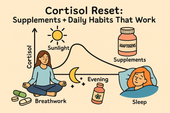
Cortisol Reset: Supplements + Daily Habits That Work
-
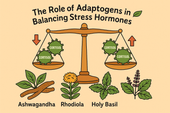
The Role of Adaptogens in Balancing Stress Hormones
Adaptogens work at the root of stress — your nervous system. 🌿 Learn how these powerful herbs help regulate cortisol, calm your nerves, and restore balance between energy and relaxation. ✨
-
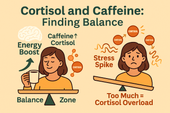
Cortisol and Caffeine: How Much Is Too Much?
Caffeine can boost energy and focus — but too much can overstimulate your stress hormones. ☕ Learn how caffeine affects cortisol, energy levels, and mood, and discover how to find the perfect balance for lasting calm and clarity. 🌿
-
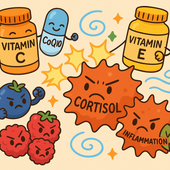
Antioxidants for Stress Management and Cortisol Control
When stress overwhelms your body, antioxidants come to the rescue. 🌿 Learn how vitamin C, CoQ10, and other natural compounds help reduce oxidative stress, regulate cortisol, and restore calm energy from within. ✨
-

Cortisol and Gut Health: How Probiotics May Help
Chronic stress doesn’t just affect your mind — it changes your gut. 🌿 Learn how cortisol disrupts the microbiome and how probiotics can help restore balance, improve digestion, and calm your stress response naturally. ✨
-

Vitamin D and Cortisol: Supporting Immune Balance
Vitamin D does more than strengthen bones — it helps regulate cortisol and support immune balance. 🌞 Learn how this essential hormone-like nutrient restores calm, improves mood, and strengthens your body’s natural stress defenses. 🌿
-
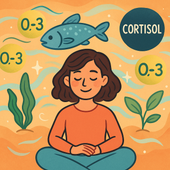
Omega-3s and Cortisol: Fighting Inflammation Naturally
Omega-3s are more than heart-healthy fats — they’re natural cortisol regulators. 🌿 Learn how EPA and DHA help reduce chronic inflammation, calm the nervous system, and support stress recovery from the inside out. ✨
-
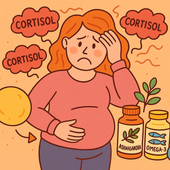
High Cortisol and Belly Fat: Can Supplements Help?
Chronic stress can make belly fat harder to lose — but supplements like ashwagandha, magnesium, and omega-3s may help restore cortisol balance. 🌿 Learn how science-backed nutrients support fat metabolism, calm your stress response, and bring your body back into harmony. ✨
-

How Ginseng Can Support Energy and Cortisol Balance
Ginseng is one of nature’s most powerful adaptogens, helping your body handle stress without burning out. 🌿 Learn how this ancient root supports balanced cortisol, steady energy, and sharper focus — restoring vitality naturally and sustainably. ✨
-
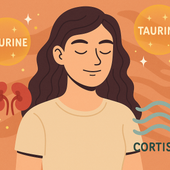
Taurine and Cortisol: Supporting Focus Under Stress
When cortisol surges, focus fades — but taurine helps restore balance. 🌿 Learn how this powerful amino acid calms your nervous system, regulates stress hormones, and sharpens concentration without jitters or fatigue. ✨
-

The Link Between Cortisol, Brain Fog, and Nutrient Deficiencies
When brain fog sets in, it’s not just in your head — it’s in your hormones. 🌿 Discover how cortisol imbalance and nutrient deficiencies like low magnesium, B vitamins, and omega-3s can cloud your focus and how restoring balance brings back mental clarity and calm. ✨
-

B Vitamins for Stress, Energy, and Cortisol Regulation
B vitamins are the foundation of stress resilience and steady energy. 🌿 Learn how this essential group of nutrients helps regulate cortisol, restore focus, and keep your nervous system calm — giving you balance from the inside out. ✨
-

Cortisol Imbalance and Chronic Fatigue: Can Supplements Help?
When chronic stress keeps cortisol high, fatigue and brain fog follow. 🌿 Learn how to rebalance your stress hormones naturally with calming nutrients, adaptogens, and lifestyle rituals that restore energy, focus, and inner peace. ✨
-

Adaptogen Stacks for Better Sleep and Lower Stress Hormones
Adaptogens can help your body recover from stress and sleep better by regulating key hormones like cortisol and adrenaline. 🌿 Learn how adaptogen stacks work to restore balance, calm the mind, and rebuild resilience — so you can rest deeply and wake renewed. ✨
-

Phosphatidylserine for Nighttime Cortisol Control
When stress hormones stay high at night, deep rest becomes impossible. 🌙 Discover how phosphatidylserine helps calm the brain, reduce nighttime cortisol, and restore healthy sleep rhythms — so you can wake up peaceful, clear, and recharged. ✨
-

Magnesium for Stress Relief and Cortisol Reduction
Magnesium is one of the most powerful natural tools for stress relief. 🌿 This essential mineral calms your nervous system, lowers cortisol, and helps your body recover from chronic tension. Learn how magnesium replenishes balance, improves sleep, and restores inner peace — naturally. ✨
-

Supplements to Improve Sleep by Balancing Cortisol
When cortisol stays high at night, sleep becomes a struggle. 🌙 Discover natural supplements that calm the nervous system, lower stress hormones, and restore your body’s natural rhythm. From magnesium and ashwagandha to L-theanine and phosphatidylserine, learn how to build deeper, more restorative rest. 🌿
-

Cortisol and Sleep: Why Stress Keeps You Awake
When stress keeps your body in fight-or-flight mode, cortisol refuses to calm down — and sleep becomes impossible. 🌙 Learn how elevated cortisol disrupts your circadian rhythm, suppresses melatonin, and turns restless nights into exhaustion. Discover how to restore balance and reclaim deep rest. ✨
-

L-Theanine for Cortisol Balance and Anxiety Relief
L-Theanine — the calming amino acid from green tea — helps quiet the mind and balance cortisol, the body’s key stress hormone. 🌿 Learn how it promotes calm focus, eases anxiety, and supports deep rest without sedation, backed by modern research and centuries of tradition. ✨
-

Rhodiola Rosea and Stress Resilience: A Natural Cortisol Regulator
Rhodiola rosea is one of nature’s most powerful tools for resilience. 🌿 This Arctic root helps balance cortisol, fight fatigue, and sharpen focus — keeping you calm yet energized even under stress. Discover the science behind Rhodiola’s adaptogenic power and how it helps your body thrive under pressure. ✨
-

Ashwagandha for Cortisol Balance: What the Science Says
Ashwagandha helps your body recover from chronic stress by calming the adrenal system and balancing cortisol — your key stress hormone. 🌿 Learn what science says about this powerful adaptogen, how it restores energy and focus, and why it’s one of nature’s most effective tools for modern stress relief. ✨
-

Supplements That Naturally Lower Cortisol Levels
When cortisol levels calm, your energy transforms — no more crashes or jitters, just steady focus and inner peace. 🌿 Learn which natural supplements and habits lower stress hormones, boost calm energy, and help your body thrive with balance instead of burnout. ✨
-

What Is Cortisol Imbalance? Symptoms You Shouldn’t Ignore
Cortisol — your body’s main stress hormone — keeps you alert and energized, but when it’s out of balance, it can drain your health. 🌿 Learn the signs of cortisol imbalance, from fatigue and anxiety to sleep disruption and stubborn weight gain, and discover how to restore calm, energy, and hormonal harmony naturally. ✨
-

The Best Daily Multivitamins for Menopausal Women
Menopause brings new nutritional needs that your old vitamin routine may no longer meet. 🌿 Discover how the right daily multivitamin can boost energy, balance mood, support bone and heart health, and keep your skin glowing. Learn which nutrients truly matter — from vitamin D to magnesium and B12 — to feel strong and vibrant every day. ✨
-

Antioxidants and Menopause: Fighting Inflammation Naturally
During menopause, oxidative stress and inflammation can quietly accelerate aging, fatigue, and skin changes. 🌿 Learn how antioxidants — from vitamins C and E to polyphenols in berries and green tea — help neutralize free radicals, reduce inflammation, and restore balance naturally. Discover the science of radiant, resilient aging. ✨
-

How CoQ10 Supports Heart Health After Menopause
After menopause, heart health becomes more important than ever. ❤️ Discover how CoQ10 — your body’s natural energy molecule — supports cardiovascular strength, restores vitality, and protects against oxidative stress. Learn how this essential nutrient helps keep your heart energized, balanced, and resilient through every stage of life. 🌿
-

Collagen Supplements for Skin and Joint Health Post-Menopause
After menopause, collagen loss affects both skin elasticity and joint comfort — but supplements can help rebuild from within. 🌸 Learn how collagen peptides, vitamin C, and other nutrients work together to restore firmness, reduce stiffness, and keep you glowing and mobile well into your next chapter. ✨
-

Calcium and Vitamin D: Protecting Bone Health in Menopause
Menopause brings hormonal changes that can weaken bones—but with the right nutrients, strength and stability can be rebuilt. 🦴 Learn how calcium and vitamin D work together to protect bone density, prevent fractures, and keep your body resilient. This guide explores nutrition, sunlight, and lifestyle habits that help your bones stay strong and vibrant for years to come. ☀️💪
-

Adaptogens for Energy and Resilience During Menopause
Feeling drained or emotionally scattered during menopause? 🌿 Discover how adaptogenic herbs like Ashwagandha, Rhodiola, and Ginseng can restore energy, balance cortisol, and build emotional resilience. Learn how these natural allies work with your body—not against it—to help you stay strong, focused, and calm through life’s hormonal changes. 🌸
-

Supplements That Help Beat Menopause Fatigue
Menopause fatigue can feel like more than tiredness—it’s a total energy crash. This guide explores how specific supplements, mindful breathwork, and therapy can help restore balance. Learn how nutrients like B vitamins, magnesium, and adaptogens rebuild your stamina, while breathwork and emotional healing calm your nervous system and bring vitality back to your days. 🌿✨
-

Herbal Blends for Menopausal Restlessness: Finding Calm in Transition
Herbal blends bring the wisdom of nature into moments of rest and renewal. Discover how soothing herbs like chamomile, lemon balm, and ashwagandha work together to calm menopausal restlessness, balance hormones, and invite deep relaxation. 🌿💫
-

Magnesium + Glycine for Deep Sleep During Menopause
Nutrients like magnesium, glycine, and B vitamins form the foundation for deep, restorative sleep during menopause. Discover how these natural compounds calm your nervous system, balance hormones, and help you wake up refreshed and recharged. 🌿💤
-

Melatonin and Menopause: Restoring Your Sleep Cycle
Nutrients are the foundation of hormone balance and energy. Learn how vitamins, minerals, and whole foods like greens, salmon, and berries nourish women’s bodies during menopause and beyond — restoring vitality, mood, and strength. 🌿🥗
-

How L-Theanine Helps With Menopausal Anxiety
Science continually deepens our understanding of the human body, from hormones to neurotransmitters. Discover how evidence-based research shapes modern wellness — bridging natural medicine, neuroscience, and hormone balance for healthier living. 🔬🌿
-

Can Ginkgo Biloba Improve Memory in Menopausal Women?
Hormone therapy can be a powerful tool for easing menopause symptoms and restoring balance. Learn how it works, the types available, and how to combine it safely with lifestyle and natural support for optimal well-being. 🌸💊
-

B Vitamins for Mental Clarity During Menopause
Nutrients are the foundation of mental and physical balance during menopause. Discover how vitamins, minerals, and whole foods like leafy greens, fish, nuts, and citrus can fuel energy, clarity, and calm while supporting hormonal health. 🌿✨
-

Mood Swings and Menopause: Natural Nutrient Support
Probiotics do more than support digestion — they help balance mood, hormones, and immunity too. Learn how a healthy gut microbiome can ease menopause symptoms, boost energy, and improve emotional resilience naturally. 🌿🦠
-

Brain Fog in Menopause: Supplements That May Help
Supplements can be powerful allies in restoring balance, energy, and focus—especially during menopause. Learn how nutrients like omega-3s, vitamin D, magnesium, and herbal adaptogens work together to support brain health, reduce stress, and promote lasting vitality. 🌿💊
-

Adaptogen Stacks for Reducing Night Sweats
Hormone detox isn’t about cleansing your body—it’s about restoring flow. Learn how the liver, gut, and endocrine systems work together to eliminate hormone buildup and how herbs like milk thistle, dandelion, and schisandra support balance, clarity, and natural vitality. 🌿💫
-

Cooling Menopause Symptoms with Herbal Support
Ashwagandha is one of nature’s most powerful adaptogens, helping women manage stress, sleep better, and balance hormones naturally. Discover how this ancient root supports calm energy, emotional resilience, and relief from menopause-related anxiety and fatigue. 🌿💫
-

Evening Primrose Oil and Menopause: What the Research Says
Hot flashes are one of the most common—and frustrating—symptoms of menopause. Discover what causes them, why the body’s “internal thermostat” becomes unbalanced, and the natural supplements and lifestyle shifts that can help you cool down, rest better, and feel more in control. 🔥💧
-

How Black Cohosh Helps with Menopausal Symptoms
Sleep disturbances are among the most exhausting symptoms of menopause—but they don’t have to rule your nights. Discover how natural strategies and calming supplements can help you fall asleep faster, stay asleep longer, and wake up feeling truly restored. 🌙💤
-

Natural Supplements That May Reduce Hot Flashes
Hot flashes can disrupt sleep, confidence, and daily comfort—but natural relief is possible. Discover the best research-backed supplements like black cohosh, red clover, and licorice root that may reduce hot flashes, balance hormones, and restore inner calm during menopause. 🌿💫
-

Omega-3s and Menopause: Supporting Mood and Inflammation
Omega-3 fatty acids are essential for hormonal harmony, brain function, and emotional balance—especially during menopause. Learn how these healthy fats reduce inflammation, support heart health, and restore calm, vitality, and focus through every stage of midlife. 🌊💫
-

The Role of Vitamin D in Menopausal Health
Vitamin D plays a powerful role in menopausal health—supporting bone strength, hormone balance, and mood stability. Discover how optimizing your vitamin D levels can improve sleep, energy, and emotional well-being while protecting long-term vitality through every stage of menopause. 🌞💪
-

Magnesium for Menopause: Relaxation, Sleep, and Hormonal Support
Self-regulation is the art of staying calm, centered, and in control—no matter what life throws your way. Learn how to strengthen emotional balance, manage stress responses, and cultivate inner peace through mindful techniques that reconnect your heart, body, and brain. 🌿💫
-

Can Adaptogens Like Ashwagandha Ease Menopausal Symptoms?
Brain fog during menopause can make even simple tasks feel overwhelming—but you’re not losing your sharpness, your hormones are simply shifting. Discover how adaptogens like ashwagandha and key nutrients can restore mental clarity, balance cortisol, and bring calm focus back to your day. 🌿🧠
-

Supplements That Support Hormonal Balance During Menopause
Herbal supplements have supported women’s health for centuries—and modern science is finally catching up. From ashwagandha and maca to red clover and rhodiola, discover how nature’s most trusted herbs can calm stress, balance hormones, and enhance energy through every life stage. 🌿✨
-

The Ultimate Motivation Stack: Supplements That Work Together
Discover how therapy helps restore motivation, focus, and emotional balance alongside supplement and mindset strategies. This empowering article explores how addressing thought patterns and emotional blocks through therapy can complement biochemical tools for long-term drive and well-being. 🧠💬


















































